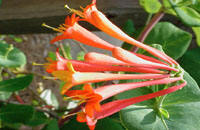Hummingbird Gardens
 The
magic that hummingbirds create in the garden never fails to enchant young and
old alike. From the
mountains
to the
plains, you can attract “hummers” when they migrate to and from their nesting
grounds.
The
magic that hummingbirds create in the garden never fails to enchant young and
old alike. From the
mountains
to the
plains, you can attract “hummers” when they migrate to and from their nesting
grounds.
Some good hummingbird plants are included in the following
table. Use a combination of annuals, perennials, vines, shrubs and trees for an
effective flowering food source from spring to fall. Hummers learn quickly which
yards in the neighborhood cater to their needs, and will continue to return from
year to year.
While you wait for your living hummer magnets to grow and
bloom, you may want to use other methods to bring those winged jewels into your
yard. Hummingbird feeders will help get things going. They supply the type of
energy source needed to fuel these flying machines. Their metabolic rate is so
high that they must feed almost constantly during the day. A feeder with red on
it helps flag them down, and you can add red ribbons to the feeder to attract
more attention from the air.
One part sugar and four parts water makes an excellent
nectar solution, which should be changed every few days. Do not add red food
coloring to your recipe—the red on the feeder is enough. Place the feeder in the
open where the hummers can find it because they fly 30-50 feet overhead. If the
feeder is under a tree or patio, they may miss it.
Place your feeder in late April for the spring migration in
the foothills, and by July 15 for the fall retreat. It is not true that hummers will
forget to fly south if you leave the feeder out too
late in the fall. Hummers migrate based on internal hormones, and the length of
the day (not food availability).
Providing for these simple needs will invite hummers to
share our landscape where they can entertain us with their fascinating antics
and beautiful colors.
Flowers that Attract Hummingbirds
![]()
Annuals (for flowers all season long) Height Color
Dahlia 2-5
feet various
Larkspur 3-6
feet white, pink, blue, purple
Four-o’clocks 2-4
feet red, pink, yellow, white
Fuchsia 1-3
feet red, pink, purple, white
Gladiolus 2-5
feet various
Nasturtium 10-12
inches red, yellow, orange
Petunia 8-12
inches various
Salvia 1-2
feet red
Snapdragon 1-4
feet red, pink, yellow, white
Spider flower 3-5
feet pink, purple, white
Flowering tobacco 1-6
feet red, pink, white, green
Zinnia 1-4
feet various
Perennials (for early blooms)
Bleeding heart 3
feet pink, white
Carpet bugle (ajuga) 6
inches blue, pink
Columbine 1-3
feet red, yellow, blue, pink
Coral bells 1-2
feet pink, red, white
Perennials
(for midseason blooms)
Bee balm 2-3
feet red, pink, purple, white
Blue salvia 2-3
feet blue
Cardinal flower 3-4
feet red
Columbine 1-3
feet red, yellow, blue, pink
Coral bells 1-2
feet pink, red, white
Delphinium 3-6
feet blue, purple, pink, white
Foxglove 2-6
feet pink, yellow, purple
Lavender 1-2
feet lavender
Lupine 2-3
feet blue, purple, pink, red
Penstemon 1-3
feet various
Red hot poker 3-4
feet red, yellow
Tall garden phlox 2-3
feet pink, red, purple, white
Veronica 1-3
feet red, blue, pink, white
Perennials
(for late blooms)
Butterfly weed 3
feet red-orange
Penstemon 1-3 feet various
Russian sage 2-4
feet blue-violet
Foxglove 2-6
feet pink, yellow, purple
Hollyhock 3-6
feet red, yellow, white, pink
Zauschneria 1-2
feet orange
Vines
Honeysuckle, Japanese perennial white, yellow
Honeysuckle, trumpet perennial yellow, red
Trumpet creeper perennial red-orange
Morning glory annual various
Scarlet runner bean annual red